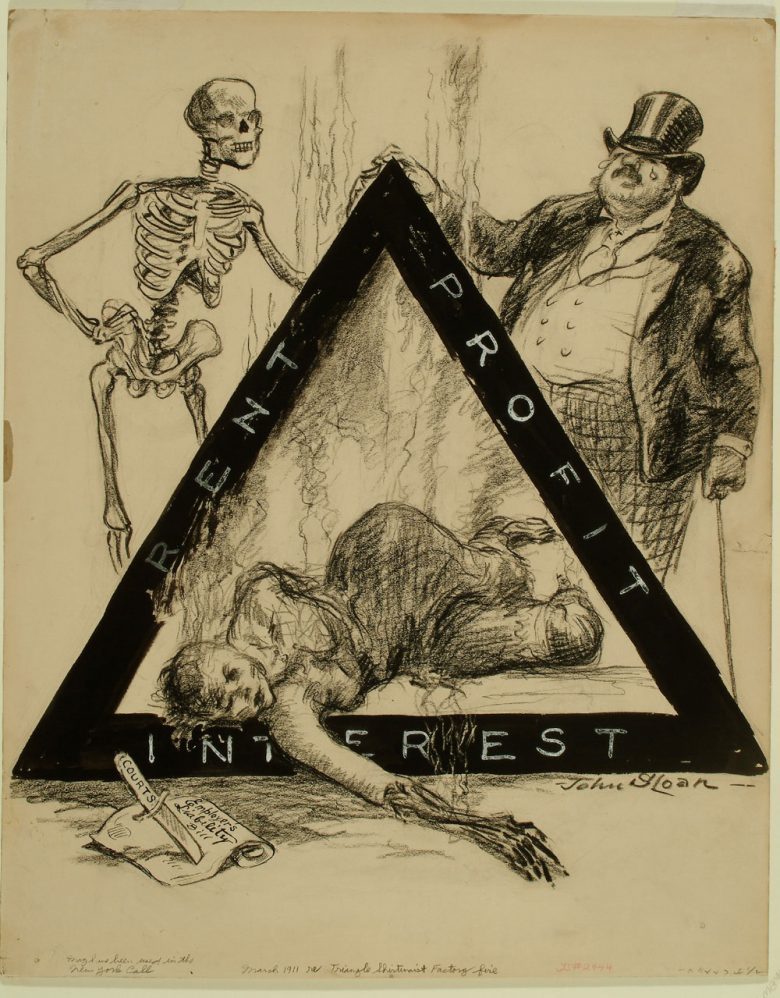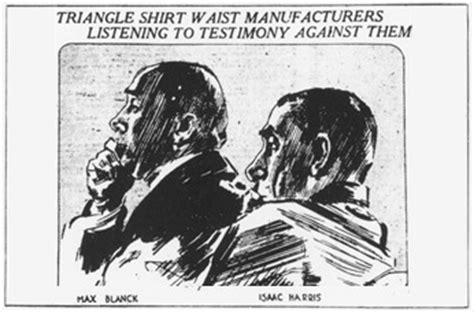Court records from the trial. Courtesy of Remember the Triangle Fire.
TRIUMPH OF THE LAW
|
After the protests, a commission was organized to investigate the fire and other factories. Thirty-six bills were passed by New York state legislature as a result of this commission's reports. Many issues were addressed by these laws such as, workplace safety, child labor, working hours, and factory registrations. These laws triumphed over injustices in the workplace for years to come.
|
Clip from a personal interview with Gerald Markowitz, Distinguished professor at John Jay College and author of "From the Triangle Fire to the BP Explosion: A Shirt History of the Century-Long Movement for Safety Health."
|
The Fourth Report of the Factory Investigating Committee
- Registration of factories.
- Physical examination of children before employment certificate is issued.
- Fire drills.
- Automatic sprinklers.
- Fire prevention; removal of rubbish; fire-proof receptacles for waste material; protection of gas jets; prohibition of smoking in factories.
- Prohibition of the eating of lunch in rooms where poisonous substances are prepared or generated in the process of manufacture; adequate hot and cold washing facilities for such establishments.
- Employment prohibited of women within four weeks after child-birth.
- Summary power of Commissioner of Labor over unclean and unsanitary factories.
- Reorganization of Labor Department; Industrial Board.
- Penalties for violation of Labor Law and Industrial Code.
- Fire-proof receptacles; gas jets; smoking.
- Fire alarm signal system and fire drills.
- Fire escapes and exits; limitation of number of occupants; construction of future factory buildings.
- Amendment to Greater New York charter with reference to the Fire Prevention Law.
- . Prohibition of employment of children under fourteen, in cannery sheds or tenement houses; definition of factory building; definition of tenement house.
- Manufacturing in tenements.
- Hours of labor of women in canneries.
- Housing conditions in labor camps maintained in connection with a factory.
- Physical examination of children employed in factories.
- Amendment to Child Labor Law; physical examination before issuance of employment certificate; school record; supervision over issuance of employment certificate.
- Amendment to Compulsory Education Law; school record.
- Night work of women in factories.
- Seats for women in factories.
- Bakeries near workplaces.
- Cleanliness of workrooms.
- Cleanliness of factory buildings.
- Ventilation; general; special.
- Washing facilities; dressing rooms; water closets.
- Accident prevention; lighting of factories and workrooms.
- Elevators.
- Dangerous trades.
- Foundries.
- Sanitation in mercantile establishments. This covered provisions for seats for female employees; cleanliness of rooms; cleanliness of buildings; size of rooms; ventilation; drinking water; wash rooms and dressing rooms; and water closets.
- Hours of labor of women in mercantile establishments limited to fifty-four hours a week in the entire State.
- Hours of labor of children between fourteen and sixteen in mercantile establishments reduced from fifty-four to forty-eight hours a week and their employment prohibited for more than eight hours a day or after 6 o'clock in the evening of any day.
- Employment of children in dangerous occupations; employment of women in core-rooms.
"The Fourth Report of the Factory Investigating Commission", 1915. Courtesy of Google Books.
There are no guilty. There are only the dead... Capital can commit no crime when it is in pursuit of profits. - Literary digest at the time of the fire. Courtesy of The University of Pennsylvania. |
The anger of the people influenced the district attorney office to seek indictment against Harris and Blanck. They were indicted on seven counts, including manslaughter. In the trial however, Harris and Blanck hired super-star attorney, Max Steuer. Steuer convinced the jury the two men had not locked the doors. Victim's families and the American people were disgusted by this. Twenty-three civil suits were then brought against Harris and Blanck from the victim's families. The factory owners settled and paid $75 per life lost, $10,950 total ($291,357.60 in today's dollar).
|
Without laws and oversight, many employers will abuse their workers and engage in dangerous and reckless work practices. Workers need a legal right to be protected on the job .
- Peg Seminario, the Director of Occupational Safety and Health for the AFL-CIO. Quote courtesy of personal correspondence with the office of Peg Seminario.


